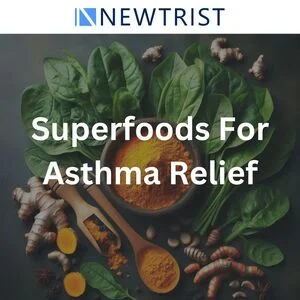Asthma can feel like a constant battle, but with the right support and guidance, relief is within reach. Chief Nutritionist Vasanthi from Newtrist Nutritionist Dietitian Dietician has helped countless individuals find freedom from asthma symptoms through personalized diet plans and accessible online consultations. Let’s explore how the asthma relief diet plan can transform your health and ease your breathing challenges.
Best Nutritionist in Bangalore
Consult 19-year-experienced Chief Nutritionist Vasanthi, in person at HSR, Koramangala, Bellandur, Haralur, Electronic city, or online across India.
Table of Contents

Asthma Relief Through Diet
When managing asthma, your diet plays a vital role in reducing inflammation, strengthening immunity, and alleviating symptoms. A carefully curated diet not only minimizes triggers but also enhances lung function, empowering you to live a fuller, healthier life. Chief Nutritionist Vasanthi brings science-backed strategies and personalized care, making asthma relief a reality for individuals across India.

Why Diet Matters for Asthma Management
Asthma is often influenced by lifestyle factors, and diet is a cornerstone of prevention and management. Nutrient-rich foods combat oxidative stress, while avoiding certain triggers can significantly reduce symptoms. A diet focused on antioxidants, vitamins, and healthy fats can alleviate airway inflammation, promoting better lung health and overall vitality.
Environmental Triggers and Asthma in Indian Cities
India’s diverse climates and environmental challenges make asthma management complex. Understanding and addressing city-specific triggers is crucial for effective relief.
Delhi: Managing Smog and Air Pollution
Delhi’s infamous smog and high levels of particulate matter create a challenging environment for those with asthma. Chief Nutritionist Vasanthi crafts dietary solutions that strengthen respiratory health, equipping you to combat pollution-induced symptoms.
Kanpur: Coping with Industrial Emissions
Industrial emissions in Kanpur aggravate asthma, making tailored nutrition essential. Anti-inflammatory foods and immune-boosting nutrients are part of the solution to protect your lungs.
Mumbai: Navigating High Humidity and Pollution
Mumbai’s mix of humidity and pollution can worsen asthma symptoms. Foods rich in magnesium and antioxidants, combined with hydration strategies, can keep symptoms at bay.
Kolkata: Battling Dust and Vehicular Pollution
Kolkata’s urban dust and traffic pollution often trigger asthma attacks. A well-planned diet can minimize sensitivity, allowing you to breathe easier amidst the chaos.
Chennai: Living with Pollen and Coastal Humidity
The coastal climate and pollen exposure in Chennai demand a proactive dietary approach. Chief Nutritionist Vasanthi incorporates anti-allergenic foods into her plans to combat these triggers.
Bangalore: Addressing Dust, Pollen, and Temperature Fluctuations
The Garden City’s seasonal shifts bring pollen, dust, and temperature variations that can exacerbate asthma. Strategic dietary adjustments provide relief and resilience.
Lucknow: Handling Construction Dust and Air Quality
Rapid urbanization and construction dust in Lucknow pose unique challenges. Nutritionist Vasanthi’s recommendations focus on boosting lung function and reducing inflammation.
Hyderabad: Dealing with Industrial Pollution
Hyderabad’s industrial activity contributes to air quality issues. Foods that support detoxification and improve lung health are integral to managing asthma in this city.
Asthma and the Role of Nutrition
Proper nutrition is a game-changer in managing asthma. Chief Nutritionist Vasanthi focuses on holistic dietary strategies that target the root causes of symptoms, offering a natural path to relief.
Foods That Help Asthma Patients
Certain foods stand out for their ability to support lung health and reduce asthma symptoms. Apples, turmeric, flaxseeds, and spinach are just a few examples of nutrient powerhouses that should be staples in your diet. These foods work together to lower inflammation and support optimal respiratory function.
Morning Rituals for Asthma Relief
Kick-start your day with soothing beverages like ginger tea or turmeric water. These simple additions can reduce morning congestion and set the tone for better breathing throughout the day.
Smart Lunch Choices to Heal and Breathe Easy
Lunchtime is an opportunity to load up on anti-inflammatory foods. A plate of brown rice pulao paired with beetroot salad or vegetable curry provides essential nutrients that support lung health.
Healthy Snacks for Improved Breathing
Midday snacks can be both delicious and therapeutic. Consider options like green tea with almonds or a refreshing apple-orange salad to combat inflammation and boost your immunity.
Dinner Ideas to Reduce Inflammation
End your day with light, nutritious meals that ease digestion and promote restful sleep. Multigrain rotis with a side of stir-fried vegetables or a bowl of lentil soup can help reduce overnight inflammation, ensuring you wake up feeling refreshed.
Avoiding Foods That Trigger Asthma
Certain foods can aggravate asthma symptoms by increasing inflammation, producing mucus, or causing allergic reactions. Knowing what to avoid is a critical step in managing asthma effectively.

Processed Meats and Sulfites: The Hidden Danger
Processed meats like sausages, salami, and bacon contain sulfites, which can irritate the airways and worsen asthma symptoms. Swap these out for fresh, lean proteins like chicken, fish, or lentils to reduce inflammation and support lung health.
Dairy Products and Mucus Production
For some asthma sufferers, dairy products can contribute to mucus buildup, making breathing more difficult. Alternatives like almond milk, coconut milk, or soy milk can be excellent choices to maintain a healthy diet while avoiding this trigger.
Sugary Snacks and Inflammation
Excess sugar can lead to systemic inflammation, which may exacerbate asthma. Replace sugary treats with natural options like dates and figs that satisfy cravings without the inflammatory effects.
Superfoods for Asthma Relief
Nutrition is your ally in the fight against asthma, and superfoods pack a powerful punch. Incorporating these nutrient-rich items into your diet can significantly improve breathing and overall health.

Why Turmeric is a Must for Indian Diets
Turmeric is a staple in Indian households and a miracle ingredient for asthma relief. Its active compound, curcumin, is a potent anti-inflammatory that soothes irritated airways and strengthens immunity. Add it to milk, teas, or curries for daily benefits.
Spinach for Magnesium and Respiratory Health
Spinach is rich in magnesium, a mineral essential for relaxing airway muscles and improving lung function. Whether in soups, smoothies, or stir-fries, this leafy green should be a regular on your plate.
Pomegranate Juice: A Natural Anti-Inflammatory
Known for its antioxidant properties, pomegranate juice reduces airway inflammation and oxidative stress. A glass of this vibrant juice can be a refreshing addition to your asthma relief plan.
Beta-Carotene Rich Carrots for Better Lung Function
Carrots are high in beta-carotene, which converts to vitamin A and supports lung health. Munch on them raw, juice them, or add them to your favorite sabzis for a nutrient boost.
Expert-Led Solutions for Sustainable Asthma Relief
To achieve lasting asthma relief, expert guidance and personalized strategies are key. Chief Nutritionist Vasanthi at Newtrist Nutritionist Dietitian Dietician offers a range of services designed to transform your health.

Why Consult Chief Nutritionist Vasanthi at Newtrist
With years of experience and a deep understanding of Indian dietary preferences, Vasanthi crafts customized plans that address your unique needs. Her evidence-based approach ensures that every recommendation works for you and your lifestyle.
The Benefits of Personalized Diet Plans
Generic solutions don’t work for asthma management. Vasanthi’s personalized diet plans consider your triggers, food preferences, and daily routine to create a sustainable path to wellness.
Online Consultations for Easy Access
Living in a busy city or a remote area? No problem. With online consultations, you can access expert advice from anywhere, making asthma relief convenient and accessible.
Asthma Relief Diet Plan
An asthma-friendly diet requires balance, variety, and consistency. Here’s how to structure your meals for maximum impact.

Morning: Energizing Beverages and Healthy Breakfast Ideas
Start your day with ginger tea, tulsi-infused water, or a smoothie packed with spinach and banana. Pair these with wholesome breakfast options like poha, idli, or oats to energize your mornings.
Lunch: Balanced Meals Packed with Nutrition
For lunch, opt for brown rice or quinoa paired with dal and a vegetable curry. A side of beetroot salad or cucumber raita adds a refreshing touch and supports lung health.
Evening: Light Snacks to Keep You Satisfied
Choose healthy snacks like roasted makhanas, nuts, or a fruit platter. These options curb hunger while delivering essential nutrients for better breathing.
Dinner: Anti-Inflammatory Options to End the Day
Conclude your day with light, nutrient-rich meals. Multigrain chapatis with a bowl of palak dal or a plate of khichdi with a side of steamed vegetables ensure restful sleep and reduced inflammation.
Closing the Loop on Asthma Relief
Why a Balanced Diet is the Key to Better Breathing
Asthma relief goes beyond medications. A balanced diet enhances your body’s natural ability to combat inflammation and allergens, empowering you to breathe freely.
Start Your Journey to Asthma Relief Today
Don’t let asthma hold you back. Take the first step towards a healthier life with personalized guidance from Chief Nutritionist Vasanthi at Newtrist Nutritionist Dietitian Dietician. Your path to asthma relief begins with the right food choices, start today.